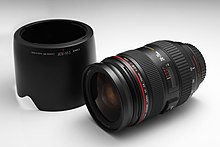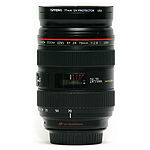Canon EF 24–70mm lens

The Canon EF 24–70mm lens is a family of professional EF mount wide-to-normal zoom lenses manufactured and sold by Canon. The first of the family, the EF 24–70mm f/2.8L, was introduced in 2002 to replace the well-regarded 28–70mm f/2.8L. Two later versions were announced in 2012. The first of these, the EF 24–70mm f/2.8L II, was announced by Canon in February,[1][2][3] but would not ship to customers until September of that year.[4] This lens replaced the Mk I, and had an MSRP of US$2299 when introduced.[1] The latest member of the family is the EF 24–70mm f/4L IS USM, which became available in January 2013.[5] The f/4 version, which is the first of the family to include image stabilization, was initially reported to be the standard kit lens for the Canon EOS 6D,[6] but did not appear in 6D kits in most markets until late 2014, and 5D Mark IV kit in 2016.
Like its predecessor, the f/2.8 Mk I lens was often considered to have excellent contrast, color rendition and decent sharpness wide open.[7] However, some samples of this lens have also been reported to exhibit deficiencies and operational problems[8] not present in the older 28–70mm lens, including poor sharpness and/or chromatic aberration. According to the head of a US lens rental firm, the f/2.8 Mk I lens "definitely has some reliability issues and a lot of copy-to-copy variation, at least some of which relate to its design."[9]
Early reports on the f/2.8 Mk II indicated significant improvement in optical quality. The aforementioned rental firm head stated, All versions of the lens include sealing against dust and water, although they are not waterproof. The f/2.8 Mk I includes an 8-bladed curved diaphragm, while both the f/2.8 Mk II and f/4 include a 9-bladed curved diaphragm. The diaphragm of the f/2.8 Mk I remains nearly circular from f/2.8 to f/5.6, according to the Canon Press release from 2002. Characteristic of zoom lenses, it exhibits some barrel distortion at its shortest focal length.
Reverse zoom
An unusual aspect of the f/2.8 Mk I lens (and the 28–70mm f/2.8L) is that its barrel extends as it zooms toward its shortest focal length. When used with the supplied lens hood, which attaches to a non-moving part of the lens, this extension results in a properly matched shade at every angle of view. Most zoom lens hoods are designed for only the widest angle of view, offering progressively inadequate shade at longer focal lengths.
This reverse zoom is illustrated with the following two pictures:
- Lens at 24 mm with a UV filter
- Lens at 70 mm with a UV filter
- Lens with lens hood
At the telephoto end (70 mm), the end of the lens is the most retracted providing the most shade protection from the lens hood. At the widest end (24 mm), the end of the lens is the most protruding providing the least shade protection from the lens hood.
The f/2.8 Mk II lens, however, has a more conventional design, with the barrel extending as the focal length increases. The lens hood is much shorter than that of the Mk I version.[9] The f/4 lens shares the same conventional design.
Macro
The f/2.8 versions are not true 1x macro lenses (1:1); the f/2.8 Mk I has a maximum magnification of only 0.29x and the f/2.8 Mk II has 0.21x. The f/4 lens, while also not a true macro lens, is considerably closer to being in that category. The f/4 has a switch-activated "macro" mode; at 70 mm, the maximum magnification is approximately 0.7x and the closest focusing distance is 20 cm.[6]
Specifications
| Attribute | f/2.8L USM | f/2.8L II USM | f/4L IS USM |
|---|---|---|---|
| Image | 
|

|

|
| Key features | |||
| Full-frame compatible | Yes | ||
| Image stabilizer | No | Yes, Hybrid system (4 stops) | |
| Environmental Sealing | Yes | ||
| Ultrasonic Motor | Yes | ||
| L-series | Yes | ||
| Diffractive Optics | No | ||
| Macro | No | Yes | |
| Zoom Lock Lever | No | Yes | |
| Technical data | |||
| Maximum Aperture | f/2.8 | f/4.0 | |
| Minimum Aperture | f/22 | ||
| Construction | 13 groups / 16 elements | 13 groups / 18 elements | 12 groups / 15 elements |
| # of diaphragm blades | 8 | 9 | |
| Closest focusing distance | 0.38 m / 1.25 ft | 0.38 m / 1.25 ft (normal mode) 0.20 m / 0.66 ft (macro mode) | |
| Max. magnification | 0.29× | 0.21× | 0.70× |
| Horizontal viewing angle | 74°–29° | ||
| Diagonal viewing angle | 84°–34° | ||
| Vertical viewing angle | 53°–19°30' | ||
| Physical data | |||
| Weight | 950 g (34 oz) | 805 g (28.4 oz) | 600 g (21 oz) |
| Maximum diameter | 83.2 mm (3.3") | 88.5 mm (3.5") | 83.4 mm (3.3") |
| Length | 123.5 mm (4.9") | 113 mm (4.4") | 93 mm (3.7") |
| Filter diameter | 77mm | 82mm | 77mm |
| Accessories | |||
| Lens hood | EW-83F | EW-88C | EW-83L |
| Retail information | |||
| Release date | November 2002 | September 2012 | December 2012 |
| Currently in production? | No | Yes | No[10] |
| MSRP (US$) | $1349.00 | $2099.00 | $999.00 |
See also
- Canon EF 24–105mm lens, available in two versions—one an L class lens, and the other a consumer-level lens—with a similar but slightly longer focal length. The L version has a maximum aperture of f/4 and image stabilization, similar to the 24-70mm f/4L IS USM, but lacks that lens' macro feature. The consumer version is also image-stabilized, but replaces the USM motor drive with STM, has a variable maximum aperture, and also lacks a macro feature.
- Canon EF 70–200mm lens has both image-stabilized and non-IS versions with maximum apertures of f/2.8 and f/4.0, and continues the 24–70mm's maximum focal length through 200mm
References
- ^ a b Canon EF 24-70 f/2.8L II Announced « Canon Rumors. Canonrumors.com (7 February 2012). Retrieved 2013-10-04.
- ^ Canon EF 24-70 f/2.8L Version 1 vs Version 2 « Canon Rumors. Canonrumors.com (7 February 2012). Retrieved 2013-10-04.
- ^ Canon EF 24-70 f/2.8L II « Canon Rumors. Canonrumors.com (6 February 2012). Retrieved 2013-10-04.
- ^ "Canon EF 24–70 f/2.8L II Has Made its Way To Retailers". CanonRumors.com. 2 September 2012. Retrieved 12 September 2012.
- ^ "Canon 24-70mm f/4 L IS, Full-Frame EF USM (2012-today)". November 2012. Retrieved 3 October 2013.
- ^ a b Westlake, Andy (6 November 2012). "Canon EF 24–70 mm f/4 L IS USM Preview". Digital Photography Review. Retrieved 6 November 2012.
- ^ Sample crops
- ^ FM reviews – Canon EF 24–70 mm f/2.8L USM
- ^ a b Cicala, Roger (11 September 2012). "Canon 24–70 f/2.8 II Resolution Tests". LensRentals.com. Retrieved 12 September 2012.
- ^ Rumors, Canon (8 April 2021). "Canon officially discontinues a lot more EF lenses". Canon Rumors - Your best source for Canon rumors, leaks and gossip. Retrieved 9 April 2021.
External links
- Official Site: Canon EF 24–70 mm f/2.8L USM Archived 14 June 2005 at the Wayback Machine
- Canon Camera Museum: 24–70 mm f/2.8L
- Official Site: 24–70 mm f/4L Specifications
- 24–70 f/4L Canon press release
- 24–70 f2.8L Review by Digital Photography Review
- 24–70 f2.8L Review by DxOMark Labs Archived 21 January 2012 at the Wayback Machine



